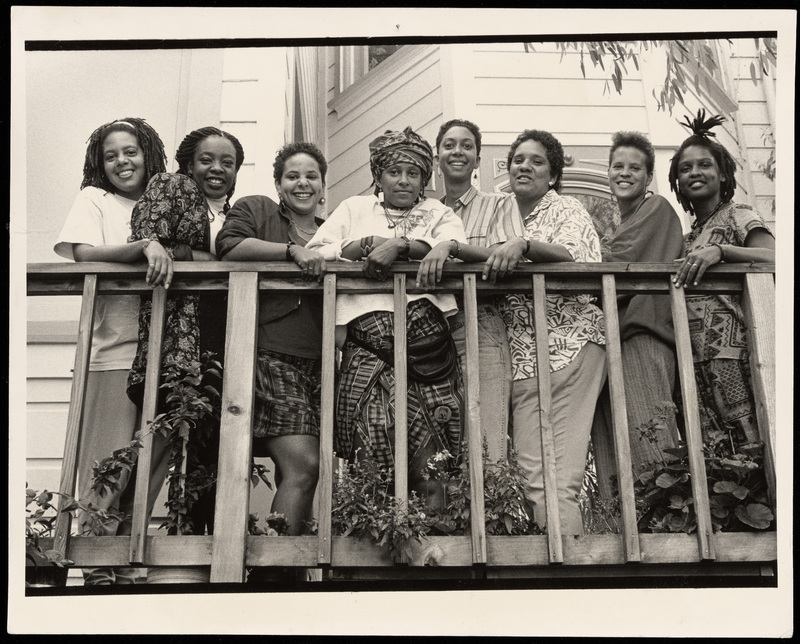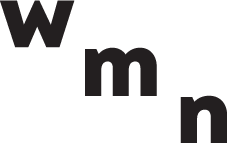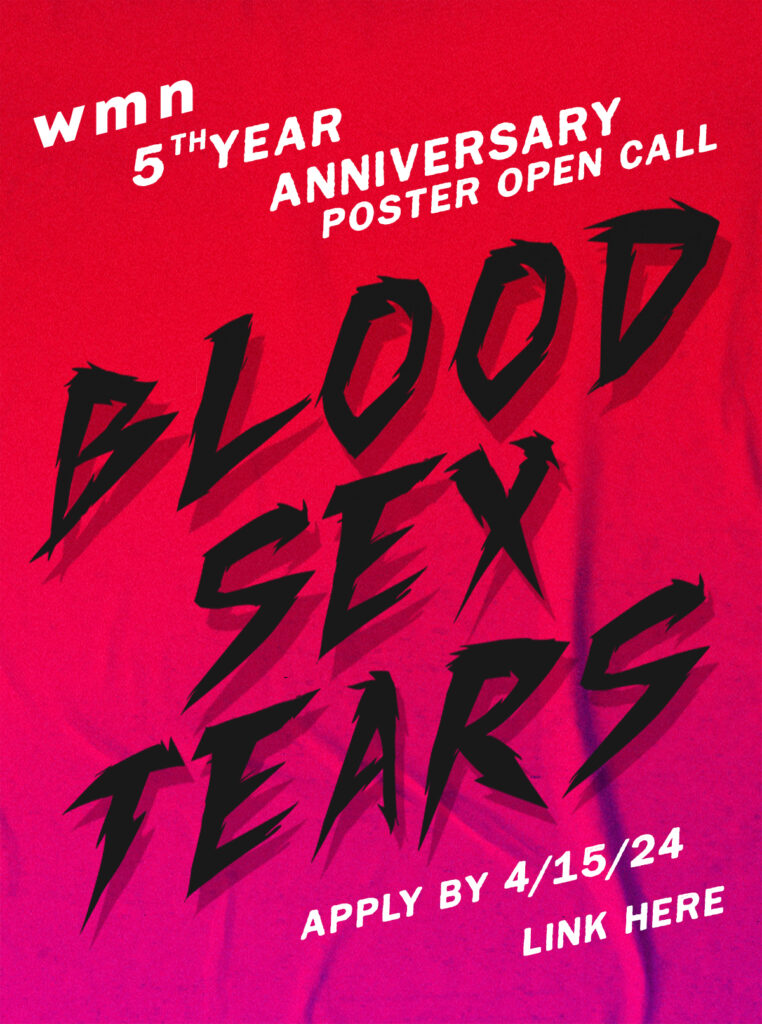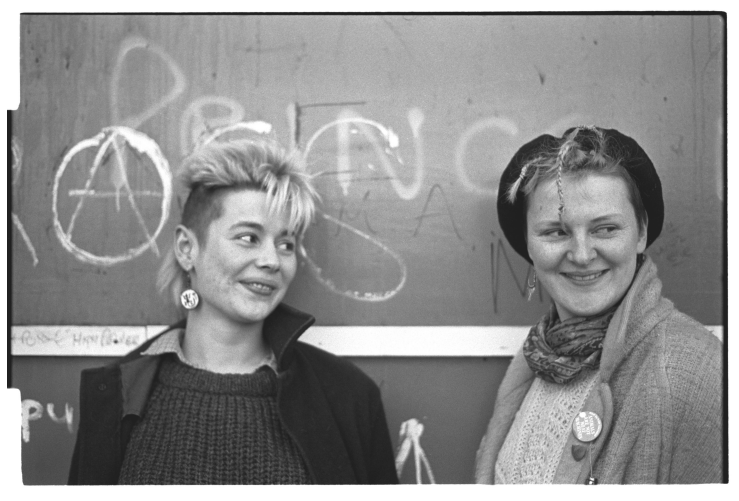Storytelling archivist and founder of the Black Lesbian Archives Krü Maekdo sat down with WMN to talk about the importance of home, ownership of your own stories, grassroots organizing and how term lesbian is an Aries from New York. Featured photos are from her recent archive highlight about Aché: a Bay Area journal for Black Lesbians from the 1980’s.
By Sara Duell

For the month of June Black Lesbian Archives focused on ACHÉ (a Black Lesbian Publication) & how we can use this organization as a conduit (Oakland, CA 1992) for Grassroots organizing & community building through these current times. We will expand more on this in the upcoming months. Stay tuned!
Most of lesbian history is so hidden and obviously Black lesbian history is even more so. Can you share how the Black Lesbian Archives came to be and what it is?
One day in 2017 while I was staying with my Auntie in Williamsburg VA, I saw this documentary The Last Lesbian Bars, about how some of the lesbian bars have been disappearing around the world. Once I finished watching, something inside of me sparked: if these lesbian spaces shut down then we don’t have places to connect and commune besides the internet. Don’t get me wrong I’m always talking about the internet, I appreciate it, but meeting in person is a completely different kind of energy.
I started researching and realized that there wasn’t a lot of information on Black lesbians even online. A lot of what I found about Black lesbians was diluted into other gay and lesbian history, I was just like “hell no! I know I’m not the only one out there searching for this info”. So, I immediately set up the Black Lesbian Archives Instagram, Facebook, website, and twitter. I was just mad and wanted to see what I could do about it. I’m that kind of person. I’ll definitely talk about shit, but best believe that if I’m talking about that shit you are going to see me doing something about that shit. I’m not all talk and no bite, I’m talking and I’m biting, too! I knew that Williamsburg, VA wasn’t the place for me to be able to grow while doing this research, so I went from Williamsburg to Chicago. I was between moving to DC, New York, or Chicago. I wanted to go to New York, but it was just too much for box. I love DC, but couldn’t see myself living there. I had been to and lived in Chicago, so I moved there.
As I was settling into Chicago, I happened to find Tracy Baim, one of the co-founders of Windy City Times, a LGBTQ+ newspaper. I emailed Tracy and I was like “Tracy! Where is the black lesbians history in Chicago? Where are they at?” She hit me back, and I always say this because I thought it was funny, because this is the culture that we live in: she was like “Is this a threat?” And I was like “No no no, no threat, I’m just really genuinely interested.” She told me I should come to this exhibit going up at Reunion Chicago called Lost & Found – the dyke spaces of the 60’s, 70’s and 80’s with Kristen Kaza and Ruby Western. The exhibit was beautiful, but I wanted to see more black lesbians. I wanted to know more history about the black lesbians that I knew were at the front lines of a lot of these movements. It went from me seeing the exhibit, connecting with Tracy, connecting with Imani at the Black Gold Affair fundraiser, and research by talking to people that were in the community. We ended up doing an exhibit at Affinity Community Services (a non-profit organization serving Chicago’s black lesbian and bisexual women’s community) on June 14, 2018. At the exhibit we had Yvonne Welbon, a dope filmmaker, producer, and screen writer, doing a book release for her book Sisters in the Life: A History of Out African American Lesbian Media-Making, and, we had a room for what I call the BLA confessional so you could sit in there and tell a story. I had a list of questions if you got a little stuck. On the other side I had a movie room, where you could go in and see the reels of people in the community being played; then the archives were plastered all over the building at Affinity. We had a film screening with Coquie Hughes’ films The Homestretch and My Mama Said Yo Mama’s A Dyke, a mixer so people could come in and mix, and a panel discussion with Chris Smith, Anna Deshawn and Pat McCombs. At the end, in August we also had an archiving on-on-one workshop. It was a full course meal! Then we did a nine day pre kick off tour the next year with an opening reception at Gerber/Hart Library and Archives. After that, we also went to D.C., Philadelphia, and New York. We were going on the Grassroots 2020 tour starting in March but then shit hit the fan.
What was your goal for the planned 2020 grassroots tour?
The grassroots tour was something I planned that would allow me to go to different cities and research how Black lesbians have done grassroots organizing in the past. Giving out flyers, being able to communicate with people face to face, building centralized places where people come and meet, organize, talk, connect, and be able to distribute information without having to distribute it online. Everyone does that differently no matter where you go; the south does it way differently than the west coast does it, and the north, the east coast, mid-west; we all do our shit differently. But there is one connecting factor that we’re all connected, right?
Even though the internet is a great way for us to connect , we don’t have control over it, the power of the internet is not in our hands and it could go at any time. I want to find out how we can build efficient communities between each other right now, as we’re seeing each other’s faces, as we’re riding these things out, as we’re communicating with each other, because if the internet were to ever shut down – what would we have? I want to be able to give people enough information on the internet, and I want people to be able to come and experience the archives for themselves in person. We live in such a scrolling, quick, fast and in a hurry of information that we are not actually taking the time on the internet to read, to really read the information that is in front of us.
I’m not sure when the grassroots tour will come back up, I said 2021, but honestly, the way things are looking right now I don’t know, we’ll have to see!
“I need a space where when you come there your worries are gone, and I want that space to be somewhere you’re not only coming to meet, but that’s your home.”
You’ve mentioned wanting the Black Lesbian Archives to be housed in a home in the future, can you share more about that vision. For example, what and where do you foresee that to be?
When I first started thinking about the vision for Black Lesbian Archives long term and what it would look like, I envisioned this home that everybody could come to. I see it as a place where people would come in and feel comfortable. A lot of archives that I have visited are very cold. I get it, because of the temperature and the way the materials need to be preserved. But the insides of a lot of these archives are just very cold, and they don’t have any life, it’s very dead, and it’s no shade to all the archivists out here doing the work. When I think of my culture, when I think of my people, and where I’m from, there is so much life and energy that goes through us and I need that in a space. I need a space to feel inviting. I need a space where when you come there your worries are gone, and I want that space to be somewhere you’re not only coming to meet, but that’s your home.
Now as far as a central location? I feel like that could be multiple homes. I’m going back and forth on that. Yes, I want it to be a place where Black lesbians can come but I’m thinking about even making it multi-cultural and having a full spectrum of lesbian history in one place. I’m all for building community in different places, but we still need these spaces where we are able to collaborate with people who don’t look like us, that’s how we learn. A skill set one person might have, or a gift could be something you do not and you can teach each other Regardless if it seems like things are changing, we still need spaces for lesbians to commune, and think, and take action.
What are your short term plans?
Right now, I’m starting to expand the archives. I don’t want to do this alone. I am not saying that I have been doing this solo the whole time, because there have been people that have been coming in and out. I do not want to carry on the legacy of these women alone, because these stories are very sacred. I’m seeing myself as a storytelling archivist; these stories need to be told, and they need to be told in a way that is respectful. I’m in a place right now where I’m looking to find a council, committees and volunteers for the Black Lesbian Archives so that we’re able to expand.
I’m also hoping to build out a mobile history van. I see it as a group of us being able to travel to different cities in this van with people showing us around their cities and how they’ve done grassroots organizing. I see it as the pretense to the actual home. Teaching and learning to story tell; how to build an archival collection. My short-term goal is really to buy this bus, gut it out, build it, and take small trips to different places to get information and do more research. This will give people a glimpse of what Black Lesbian history is and has been.
What are some of your favorite pieces or stories out of the archives?
Vernita Gray, I will always tell the stories of Vernita Gray! Tracy Baim, gave me a book she wrote about her: Vernita Gray: from Woodstock to the White House and she was a Sagittarius soldier! She had a home for those who had gotten kicked out of their house for living their truth. She also had a hotline for people to call in, and it was on the FBI list; that’s a whole other story. She had people living in her home and sleeping in her tubs. She kept her home open to people in the community who didn’t have nowhere else to go.
There is also this story of how she and her roommates had a party at University of Chicago, it was the first gay lesbian party that they had, and they didn’t think nobody was going to come. At that time people were very much in the closet, it was a hush-hush thing, so when they had this dance, all these people showed up and it got so wild and out of hand they had to shut it down. Even though they didn’t know the outcome of what that would be they still did it anyways. They still strived to create that space for people who were, regardless if they knew what it was or they were questioning, all those people came to connect to other people. I love that sense of community building and people risking it all. Risking it all to change shit and do something that is beneficial to the community.
That’s definitely one of the stories I love to tell, because to me it really shows her heart; shows where her mind was. The reason people were in that house was because she genuinely cared about these people who literally didn’t have a place to go. What does home look like when you don’t have it? Or what does home look like when you do have one, but are still searching for that community base?

What does the word lesbian mean to you?
A lot of people have a hard time identifying with the term lesbian. But to me there is something so revolutionary about the term. I feel like the word lesbian, the term, it’s bravery, coming from nothing, like the rose that grew from the concrete. I think of the women who weren’t afraid to be who the fuck they were, and just be out with their shit and not give a damn. That was very in your face. I think of that Lilith energy, I think of an Arian energy. If the lesbians had a zodiac sign it would probably be Aries, because it’s just so much “yeah, I’m here. I’m not going to rely on you”. It takes charge, stating your claim you’re not shying away from who you are. The term is more than just who you’re sleeping with, it came from the concrete! It probably came from New York, yo!
A lot of us wouldn’t have been able to integrate in bars if it wasn’t for the lesbians. I wouldn’t even be talking to you right now! Or I probably would, because I’m that motherfucker. I could talk about the lesbian term all day. Honestly I’ll probably do an exhibit about it. Not just the Black Lesbian Archives but the term lesbian, and the roots that this term comes from. And digging into that. It’s powerful, it’s a powerful word to use. It’s a powerful way to state your claim. I love it, it’s amazing.
“If the lesbians had a zodiac sign it would probably be Aries, because it’s just so much ‘yeah, I’m here. I’m not going to rely on you’.”
Are there lesbians that you look up to? From the past or current, living?
Oh yes, Chris Smith from Affinity, Imani Rupert-Gordon out of Affinity, and Pat McCombs, for sure. These women aren’t typical women, and I hate to use the word typical, but they ain’t no basics. It took a tribe; it took a community of people to make shit happen. They knew the odds were against them; they knew what they would be going up against, but they still chose to do it anyway.
Affinity would not be here if you didn’t have a group of women, who we’re having meetings, having meetings and trying to dodge bullshit to create this space for lesbian women to come together and commune! If they hadn’t been looking around realize that we need these spaces, how are we going to get it? Not having much but still being able to manage and create a space that is still living and breathing. Affinity is on its 25th year this year, and it’s the only Black lesbian organization that I know that is still living and breathing our history.
You have to know your past before you can shoot fast forward into the future! You have to understand it, you have to really sit down and tune in with that it before you can just carry on or you’ll forget where you come from. I could talk about all these things: me being Black, me being lesbian, me being a woman, I could talk about these things all day but if I don’t know where I come from? All of this shit don’t mean a goddamn thing. It really don’t!
These women that have been doing this work, I commend them all, I pay my respects to them and I always will even, if they are still living, or gone.
“I could talk about all these things: me being Black, me being lesbian, me being a woman, I could talk about these things all day but if I don’t know where I come from? All of this shit don’t mean a goddamn thing. It really don’t!”
What kind of support does the Black Lesbian Archives need right now?
I would definitely say that funding is one of the biggest things, because this work is a lot. I have also been trying to adjust the scope of how I’m bringing in the archives. When I first started, I encouraged everyone to just submit their archives, but we hadn’t created a submission process of how we were getting the archives, the dating, getting that contact info and scanning. I’ve been learning that as I’ve moved on, but I came into this from a storytelling perspective, so I have been able to piece together enough to share a story, however, the backend stuff is what I’m really trying to figure out. I want to make sure that wherever we are putting our archives, it goes to a place where people are actually going to take care of them, and preserve them. I think that’s why I want to expand too; so we can have more conversations about how to build archives with other people as well.
I talked to Bay Area lesbian archives and even though they have been in this game for a long time, they just started off on their first 5 years of actually archiving the stuff that they have. I want to learn from other people and figure out what would be the best method for the BLA. I get that there are resources out here, but it is important for us to establish and create our own. That’s another reason why I want this in a centralized place because we need to be sharing our own stories versus other people sharing and telling our stories for us.

Tell me more about the importance of Black lesbian telling Black lesbian stories? Is it so it’s not just pushed away in mainly white archives or becomes a subsection of that?
You need the people that were there telling the stories, and not letting other people tell those stories for you. What happens is that we go through these periods of time where we have other people telling our stories and we go off thinking that these things are true, but then when we go back to the original texts and say “wait a minute”. That’s one thing that I love about archives because I can go back and I can follow up. We have to be able to interpret and tell our stories, the honest to god truth, no matter how scary that shit is, no matter how fucked up or great that shit was. We have to share it and we have to tell it.
I have had so many people come up and tell me that if they would have seen the Black Lesbian Archives years ago, they probably would have been out. We have to be on the front end, whether we’re writing or we’re organizing. When you have someone telling a story that is like you, or that has been in the same shit that you’ve been in, you will connect to that person and you will listen.
We have to understand how vital and important it is to be able to share stories, to be able to preserve them, and keep doing that work of passing them along. Itt can change the scope of the world.
Krü Maekdo (make-do) is a multi-media artist known for her work as an archivist with the Black Lesbian Archives. An ongoing archival herstory project to uplift the voices of Black Lesbians. To educate, preserve and bridge inter-generational gaps between communities. Kosmic Rootwork Astrologist @ Aranae Storm and CEO of Maekdo Productions. A multi-media production company producing media & event programming. Serving women’s arts, community & culture in the LGBTQ+ community.


